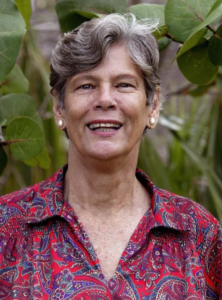Maggy Hurchalla
The recent Everglades Coalition Conference provided a wealth of information about what’s happening in South Florida.
The sea level is going to rise faster – in Florida more than most places.
The weather is going to continue to change.

There will be more extremes – more floods, more droughts.
That makes it harder to manage water.
There will be less total rainfall and it will evaporate faster because it is getting warmer.
We’ve already overcommitted what we have and there will be less water to use.
Planned storage reservoirs were designed before we recognized the changes in weather patterns.
We are going to have too much saltwater and not enough fresh water.
Florida will be ground zero for what’s happening.
The saltwater is drowning the mangrove coastline.
The lack of freshwater “counter-flows” coming down the River of Grass is killing seagrass in Florida Bay and destroying sawgrass peat at the southern end of the Everglades.
If you plan to live here or love someone who does, there are answers that won’t make us miserable.
We like to blame these weather changes on cutting down the Amazon Rainforest, but Florida actually has more stored carbon — the heat-trapping greenhouse gas that is causing earth’s temperature to rise. The Amazon’s carbon is in big trees. Ours is underground and underwater. We need to make sure it stays there.
An acre of seagrass in Florida Bay stores 15 times as much carbon as an acre of rainforest.
Our wet carbon storage systems capture new carbon 40 times faster than the rainforest. Many are struggling. We need to ensure they thrive.
What we do to and for our seagrass, mangroves, sawgrass and the wetlands that make up so much of Florida, will have local and global consequences.
Failing to send clean water south from Lake Okeechobee to keep the Everglades wet and to get fresh water to Florida Bay will dramatically increase the rate of sea level rise and weather changes.
Everglades restoration is good for us, good for the Everglades and good for the world.
Now, we can be first in line for federal funding from the Infrastructure Bill, the one that passed.
We learned at the conference about an opportunity to be first in line to join a Washington initiative for state and local governments to acquire public wild land. Priority will go to projects where folks work together at all levels.
We have the Land Acquisition Trust Fund with a billion dollars in it that Floridians approved for buying public lands.
We have ready-to-go projects across the state and the opportunity to buy wet wild places that are valuable carbon sinks.
Develop these lands and we will make things worse. Buy and restore them, and we will get to enjoy and protect God’s creation.
We can have top priority for federal funds as a national model for exactly what Washington’s public lands initiative wants to accomplish in terms of cooperative efforts.
IF the governor could convince the state legislature to spend the $1 billion in the Land Acquisition Trust Fund, we could dramatically increase our acquisition dollars.
Keeping carbon in the ground, while saving and restoring wetlands and wild places, we could make a global contribution to staving off catastrophic losses.
And save ourselves here at ground zero.
We don’t have to wring our hands in despair or ignore the biggest challenge of this century.
We can face that challenge in a way we can all be part of and all be proud of.
Maggy Hurchalla is a Florida native, a four-term Martin County Commissioner, a winner of the National Wetlands Award, a member of the Everglades Hall of Fame and a fighter for Florida’s environment.



